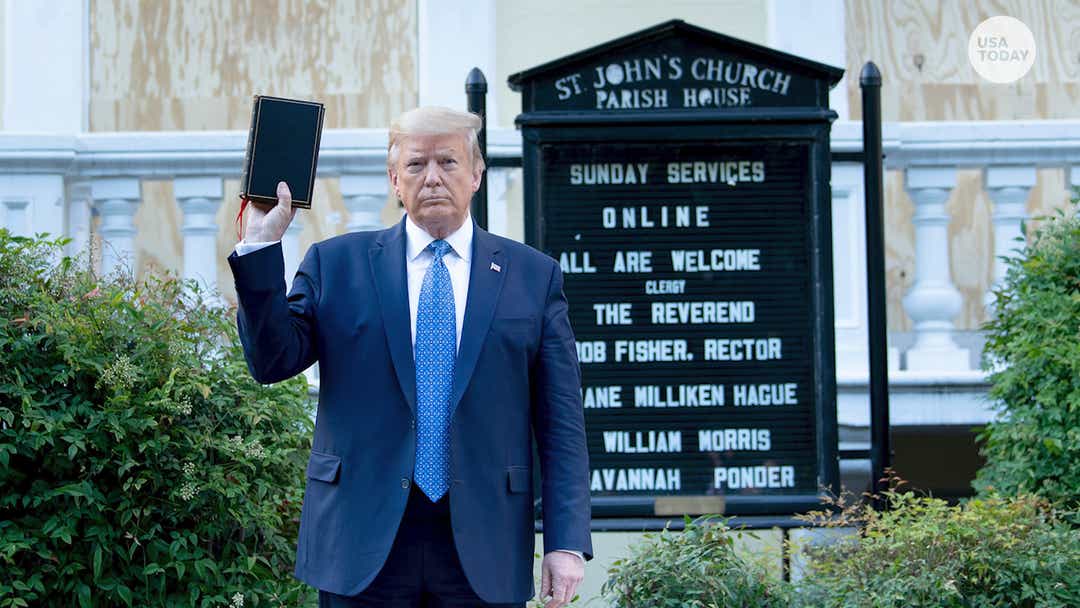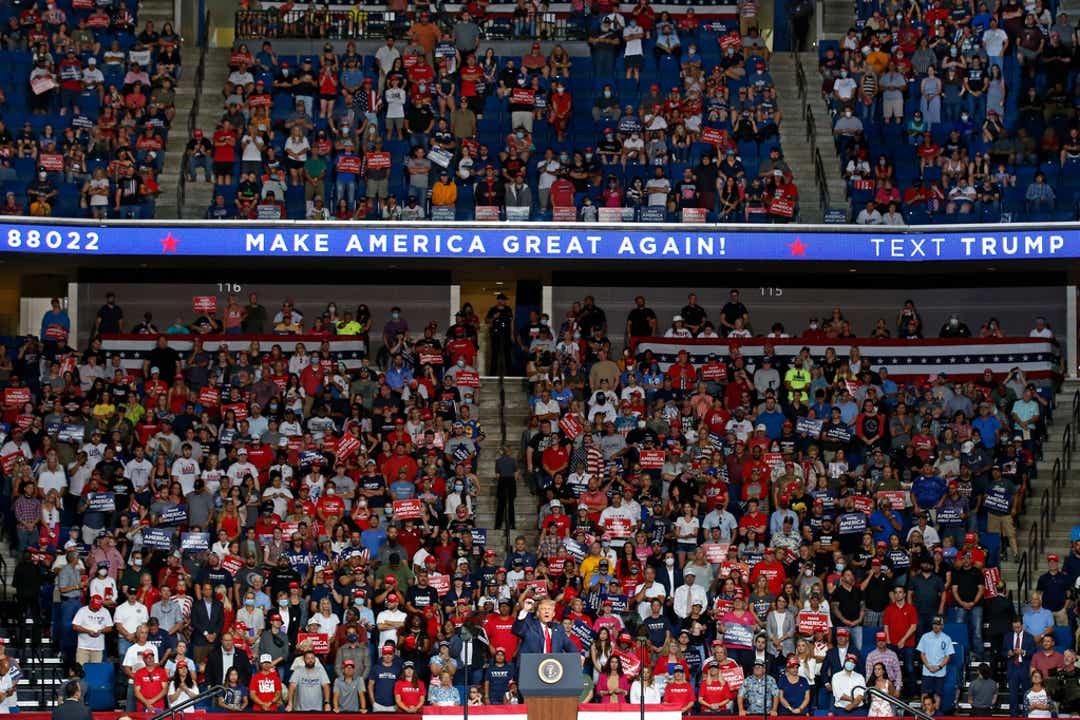The month of June saw coronavirus cases once again on the rise, 2020 presidential campaigns barrel ahead and the country reckoning protests against police brutality and racism.
President Donald Trump kept an edge on supporters' enthusiasm but drew criticism on issues from his first major rally since pandemic lockdowns to the clearing of protesters for a photo op with a Bible, while former Vice President Joe Biden locked down delegates needed for the Democratic nomination.
As we head into the rest of the summer, here is a look back at what happened in June of 2020, the month that contained a year's worth of major political news events, which will likely be pivotal for the months ahead and become contentious campaign issues.
.
Chemical irritants used against DC protesters for Trump photo op

Trump drew criticism from both sides of the aisle after protesters were forcibly cleared ahead of his walk to St. John's Church, near the White House, for a photo opportunity on June 1.
The area around the church and in Lafayette Park had been the site of large protests against racial discrimination and police brutality in the wake of George Floyd's death after a Minneapolis police officer knelt on his neck for almost nine minutes. Trump's handling of the situation drew rebukes from former top administration officials including former Defense Secretary James Mattis, former Chief of Staff John Kelly and Joint Chiefs Chair Mark Milley.
After the photo op, secret service announced none of their officers used tear gas or pepper spray before walking it back days later in a statement, tweeting that "After further review, the U.S. Secret Service has determined that an agency employee used pepper spray on June 1st, during efforts to secure the area near Lafayette Park.”
Trump fired Manhattan's chief federal prosecutor
Geoffrey Berman, Manhattan's chief federal prosecutor, was fired by Trump last month after refusing to resign. Pressure for Berman to resign came from Attorney General William Barr, despite Barr’s recent glowing assessment of Berman.
Berman’s refusal to resign came after the attorney general announced that Berman would be stepping down in order to make room for Trump’s new nominee, Jay Clayton, who currently chairs the Securities and Exchange Commission.
In a statement after Barr’s announcement, Berman said that “I have not resigned and have no intention of resigning... I will step down when a presidentially appointed nominee is confirmed by the Senate. Until then, our investigations will move forward without delay or interruption.”
Through his tenure, Berman has pursued several high-profile investigations into Trump administration allies, including the president’s ex-personal lawyer Michael Cohen and current attorney Rudy Giuliani as well as the funding operations of the Trump inaugural committee.
Although the firing of Berman was ordered by Trump, he seemed to distance himself from the dismissal, saying that the decision to remove Berman was Barr’s and telling reporters that he wasn’t “involved.”
Joe Biden got enough delegates to be the nominee
Biden finally locked up enough delegates needed to officially become the Democratic nominee in early June, reaching 1,991 pledge delegates after primaries in Maryland, Indiana, Rhode Island, New Mexico, Montana, South Dakota and Pennsylvania.
While Biden was already the presumptive nominee after Sen. Bernie Sanders, I-Vt., suspended his campaign, this marked a major milestone in Biden’s path to the nomination. The DNC announced later in June the convention in Milwaukee would be scaled down and dispersed throughout the country, but Biden still plans to accept the nomination in person in Milwaukee.
Trump resumed his re-election campaign

President Trump continued his re-election campaign with a rally in Tulsa, Oklahoma late this month. Health experts called for it to be canceled due to the risks of holding a mass gathering during the pandemic, especially as coronavirus rates spiked in Tulsa. The Trump campaign went ahead with the encouragement of Oklahoma's governor.
The campaign boasted that it received more than a million ticket requests for the rally, but according to an estimate from the Tulsa Fire Department's fire marshal, only 6,200 people showed up. The BOK Center, where the rally took place, has capacity for 19,000 people.
Since the rally, at least eight Trump campaign staffers and two Secret Service agents have tested positive for the coronavirus. Trump made news at the rally for saying he wanted to "slow the testing down," too.
Multiple Trump advisers and Republican strategists characterized the rally as a misfire in the days following it. White House Press Secretary Kayleigh McEnany disputed reports that the president was displeased with the turnout, however, saying Trump was "very pleased" with the event.
Trump's shaky return to the campaign trail was followed by polls showing that he currently trails presumptive Democratic nominee Joe Biden in six crucial swing states, ones that Trump had won in 2016.
SCOTUS affirms human rights protections, opposes environmentalists
The Supreme Court made two major decisions this month concerning human rights cases. The Court granted LGBTQ people federal protections in the workplace and prevented the Trump administration from rescinding DACA. In both instances, conservative justices sided with the court's liberal minority. Conservatives in Congress and the president criticized both decisions and vowed to appoint more conservative justices to the court.
The Supreme Court unanimously upheld the constitutionality of the Financial Oversight and Management Board for Puerto Rico, which was created in 2016 in response to Puerto Rico’s debt crisis.
In a 5-4 ruling, the court also struck down state restrictions on abortion clinics. The court ruled a Louisiana law, which required doctors who perform abortions to have nearby hospital admitting privileges, to be unconstitutional. The law was considered likely to close most of the state's abortion providers.
In a 7-2 ruling, the court decided the federal government has the authority to allow a proposed $7.5 billion natural gas pipeline to cross under the Appalachian Trail, removing a key obstacle from the project going forward.
Hours after the court ruled on DACA, Trump sent out a tweet calling for "new Justices," followed up with another saying he would release a list of potential conservative Supreme Court nominees by Sept.1.
House passes contentious police reform, DC statehood bills
The Democrat-led House of Representatives passed two key bills that were met with resistance from congressional Republicans this month.
In the wake of Floyd's death — and weeks of protests nationwide decrying police brutality — the House approved a sweeping police reform package that would ban chokeholds and end qualified immunity for police officers accused of misconduct.
The House approved the package on the heels of blocking one proposed by the Senate, which Democrats argued did not go far enough. Senate Majority Leader Mitch McConnell, R-Ky., has already said the Republican-controlled chamber would not take up the legislation.
The House also passed a bill that would make Washington, D.C., its own state. No Republican voted for the bill, and it is unlikely to advance through the Senate. This was the first time a Washington statehood bill has passed in either chamber of Congress.
COVID cases spiked throughout the country
Several U.S. states have reported record coronavirus cases as the pandemic continues, trending upward in about half of them. Earlier this week, top infectious disease expert Dr. Anthony Fauci told Congress that new infections could increase to 100,000 per day if the country doesn’t get its surge of cases under control, saying that several states may have moved “too quickly” and did not follow proper guidelines for safe reopening.
Vice President Mike Pence received criticism for writing an op-ed in the Wall Street Journal, declaring that there was no "second wave" of cases as several states were working to roll back plans to reopen.
States like Arizona, California and Delaware began re-closing some bars and restaurants as others, like Arkansas, Maine, Nevada and New Mexico, delayed any further phases.
Intelligence report says Russia put bounty on U.S. troops
According to multiple news sources, U.S. intelligence officials said Russian operatives secretly offered cash payments to Taliban-linked militants to kill coalition troops — including Americans — in Afghanistan last year. Russia and Afghanistan have denied the reports.
The New York Times and Associated Press reported in late June that Trump was briefed on the intelligence assessment and took no action after. According to the Times, the briefing took place in late March, though Trump and Director of National Intelligence John Ratcliffe deny that Trump was ever briefed.
Facing ongoing scrutiny of his response, Trump called the "Russia Bounty" story a "hoax," as his administration continues to brief members of Congress about the intelligence.
The Pentagon released a report on Wednesday claiming that Russia is currently working with the Taliban to expedite U.S. withdrawal from Afghanistan.
Contributing: Nicholas Wu
"news" - Google News
July 02, 2020 at 03:53AM
https://ift.tt/2YQ1CSz
Trump's photo-op during protests outside the White House and other key June political moments - USA TODAY
"news" - Google News
https://ift.tt/2DACPId
https://ift.tt/2Wh3f9n
Bagikan Berita Ini














0 Response to "Trump's photo-op during protests outside the White House and other key June political moments - USA TODAY"
Post a Comment